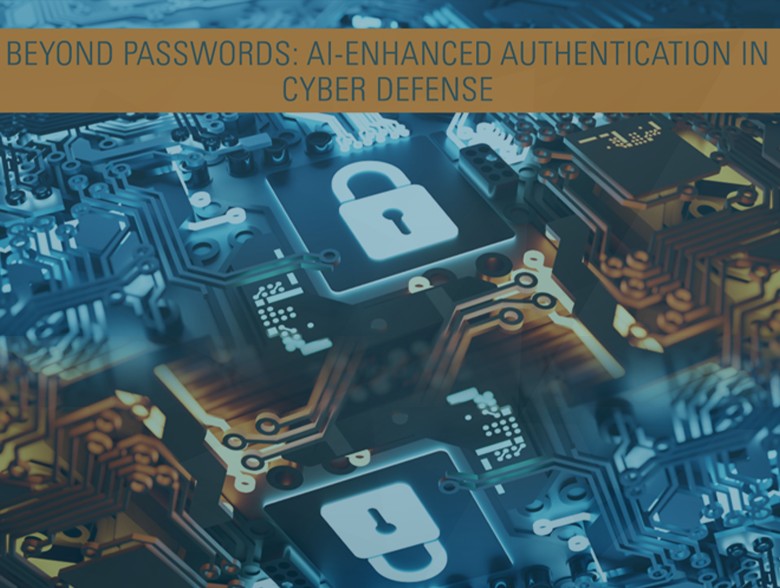- Sony will give you a free 55-inch 4K TV right now - but this is the last day to qualify
- I've used virtually every Linux distro, but this one has a fresh perspective
- I replaced my JBL speaker with this surprise alternative. Here's why it's my new top pick
- I replaced my JBL speaker with this surprise alternative. Here's why it's my new top pick
- Every dad should build their toolkit with theses 10 DIY gadgets
Beyond Passwords: AI-Enhanced Authentication in Cyber Defense

By Kathleen Dcruz
Why all the noise about artificial intelligence? Now more than ever, AI is becoming part of our lives faster than you could imagine. The question that begs, therefore, is, ‘Are we ready for an AI takeover?’
In production and supply chain processes, most of the technology adopted is operated with machine learning and artificial neural networks, which computerize and completely perform the work procedures.
Moreover, technology proves to be beneficial to society and businesses in leveraging AI for cyber-security defense. AI is gathering the interest of many. However, AI is an information technology often used as a cyber-security argon. The main question is, what can it achieve in this present time?
- AI Provides Continuous Coverage
Technology and online platforms are always actively in use. That makes them prone to cyber threats and attacks since they are used regularly and are easily accessible. IT technicians and engineers need to be able to adequately oversee the cyber-attacks regardless of the strenuous, lengthy work shifts.
To intensify authentication and instant detection of a threat, it is crucial to use data solutions such as; prospective analysis, matching patterns, and verification of previous data history. If an approaching attack is detected or suspected, it alerts the cyber security team, notifying them to act promptly.
It is possible to engineer artificial intelligence systems to defend the network, secure data, and protect connected devices. To prevent a breach, AI will disconnect and cut off the network and log out of the devices to safeguard the system.
This acts as a first-hand protection measure, enabling IT engineers to study the attack and devise further prevention methods carefully. Moreover, it is efficient when there is no workforce in charge. AI guarantees network and system security.
- AI Addresses the Rise of RaaS

With the current dependence on technology and digital platforms, ransomware is the main cause of concern.
In 2020, ransomware constituted up to 27% of all malicious software attacks. This malware has nonetheless advanced to keep up with technology. Ransomware has progressively advanced, is more accessible, and has greater damaging effects. Since it is easily available, it is subsequently becoming greatly widespread.
Malware and pernicious codes created by firms are being procured and utilized as destruction instruments. Today, hackers use advanced cyber-attack gadgets, mechanisms, and materials no matter their level of experience.
This, therefore, calls for adopting greatly proficient cybersecurity technology operated by artificial intelligence to assess, prevent and rapidly counter the attacks.
AI security components can warn IT technicians against imminent attacks beforehand by; identifying susceptible system and network domains and precise points of attack. Furthermore, AI solutions can advance into malignant codes, also called “suspicious observables” This feature allows the IT workforce to understand better its purpose and its effects on the network and digital systems.
- Improving the Defensive Cybersecurity

Technology is being utilized in almost every aspect of today’s life; therefore, it is our obligation to safeguard our infrastructure. A single destruction of the Global Positioning System (GPS) would cause power systems, banking industries, airports, trucks, and shipping activities to shut down. Even though humans can guard important technology systems, they cannot be well equipped to detect possible threats since hackers gradually implement advanced cyber-attack tactics.
Conversely, it is fortunate that machine learning solution features gradually equip AI with up-to-date knowledge as it obtains greater experience and gains further data. Darktrace develops self-taught security systems that adopt AI to locate and halt cyber attacks; most attacks are rarely known or newly developed.
This illustrates the dynamic nature of technology, hence the need to gain more knowledge on cyber-attacks, their mode of progression, and their relation to and impact on the digital world. The continuous outburst of cyber threats potentially causes intense distress.
Moreover, it instructs AI on what to be cautious of, defensive methods against cyber attacks, and how to identify areas vulnerable to new attacks. This improves AI’s defensive and rational ability. Despite cyber attacks’ negative and detrimental impacts, they present various advantages to AI and machine learning technology.
- AI Responds with Speed
AI is advantageous because it provides solutions that analyze and rapidly transmit attack reports faster than human response actions. Machine learning operations use complex factual information, pattern identification, and forecast analytics to respond with unique, highly accurate, and rapid action.
AI is more prompt and dependable whenever appropriate data is at its disposal. This makes it a perfect technology for detecting potential threats, developing ways to deal with them, and responding quickly and adequately to the attack.
AI gives the cybersecurity team greater control over their expertise and a competitive advantage in the workplace.
- The Digital and AI Arms Race

On the contrary, AI can point out shortcomings, pilot malicious cyber attacks, and establish an ever-aggressive strategy. This can be distinctively expressed as a technological escalation powered by AI or, rather, by the digital space. It is critical to consistently leverage new technology and implement new approaches to maintain a competitive edge and take the lead in cyber security. This is exactly the purpose of AI in defensive cybersecurity.
Even though it might currently be viewed as argon, this is rapidly transforming. AI has a major role in defensive cybersecurity in the present times and also in the times ahead. AI facilitates the provision of timely 24-hour defenses, performs intricate threat investigations, and ascertains that the defenses are sent out rapidly in case of a possible attack.
The rise of RaaS and other unforeseeable threats makes all necessary cybersecurity assistance essential.
Final Thought
From the above discussion, it is evident that AI is deemed to be a double-edged sword. AI can be utilized to one’s benefit if well-managed and responsibly used.
It is consequently important to comprehend that even though the current debate on the link between AI and cybersecurity has emphasized the negative effects of the technology, it is critical to always bear in mind that AI greatly safeguards us against cybersecurity threats.
About the Author
 Kathleen D. is a passionate writer and guest blogger. Writing helps me improve my knowledge, skills & understanding of the specific industry. I love writing and sharing my knowledge mostly in the tech industry. I believe technology is the real wealth and want to spread my belief across the world. Apart from writing, she loves traveling & cooking.
Kathleen D. is a passionate writer and guest blogger. Writing helps me improve my knowledge, skills & understanding of the specific industry. I love writing and sharing my knowledge mostly in the tech industry. I believe technology is the real wealth and want to spread my belief across the world. Apart from writing, she loves traveling & cooking.

